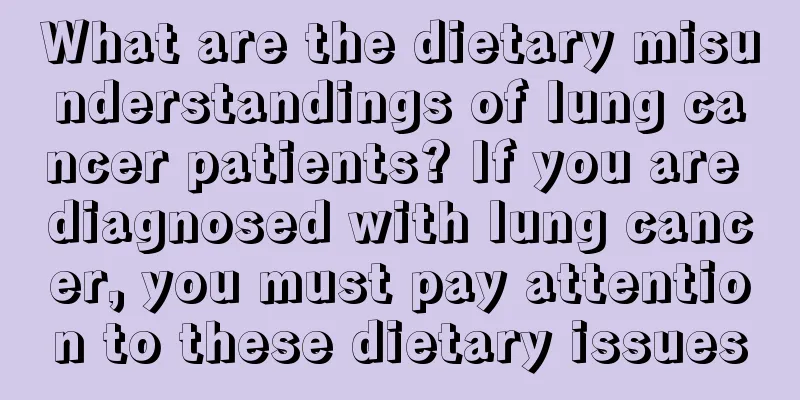What are the dietary misunderstandings of lung cancer patients? If you are diagnosed with lung cancer, you must pay attention to these dietary issues

|
Nowadays, we are facing more and more diseases, and lung cancer is already a type of cancer with a very high incidence rate in life, so we must keep abreast of the relevant information about lung cancer in life. So, what are the dietary misunderstandings of lung cancer patients? Let's take a look at the experts' introduction to the relevant content: Many patients and their families think that since they are sick, their bodies are naturally weak, especially after chemotherapy, radiotherapy and surgery, so they like to use protein powder, bird's nest, ginseng, crab, turtle, etc. to supplement their bodies. In fact, this method of supplementation is not conducive to the stability and recovery of the disease itself. Tumor is a process of cell proliferation and apoptosis. Actively controlling food intake and changing eating habits play a vital role in anti-tumor. Many patients will exchange dietary experiences with each other during treatment and blindly follow others' practices. However, everyone has different physiques and conditions, so they should not blindly follow others' dietary experiences. Patients with better economic conditions can selectively take some health supplements on the basis of a normal diet; patients with poorer economic conditions should take effective basic nutrition and do not need to pursue high-priced health supplements. It is best to consult a doctor before choosing health supplements. Blindly following the prohibition of eating irritating foods. So-called "irritating foods" refer to foods that can cause recurrence of old diseases or aggravate new diseases, such as bean sprouts, leeks, alfalfa, goose meat, chicken, dog meat, beef, seafood, etc. Many patients want to eat them, but they are worried about causing tumor recurrence and stay away from them. In fact, this understanding is wrong. "Irritating foods" is a saying among the ancient Chinese people. Its scientific validity has yet to be verified. Some so-called "irritating foods" are actually beneficial because they are rich in protein, vitamins, minerals, etc. Eating them in small amounts can actually help cancer patients recover. In fact, different cancers require different diets. For example, lung cancer patients should eat less high-fat foods, eat more vegetable and fruit foods, quit smoking and limit alcohol consumption; pancreatic cancer patients must eat a light diet, eat small meals frequently, and strictly control greasy foods; liver cancer patients should take in appropriate amounts of protein, vitamins, minerals, etc., but not in excess; breast cancer patients should increase their intake of vegetables and fruits, and reduce the proportion of animal fat and high protein in their diet. |
<<: How to treat advanced lung cancer better? Three common methods for treating advanced lung cancer
Recommend
The wisdom tooth hurts a bit, can I have it removed?
The growth of wisdom teeth is a relatively common...
How big can thyroid cancer grow?
Thyroid cancer generally does not grow very large...
Notes on black light therapy
Black light therapy, also known as UV light thera...
The difference between polarized light and UV protection
Polarization means using the principle of reflect...
How to prevent glioma growth
The course of glioma varies according to its path...
Experts introduce 4 treatments for advanced colon cancer
There are more and more patients with colon cance...
How should ovarian cancer be treated? Several effective methods for clinical treatment of ovarian cancer
The incidence of ovarian cancer is lower than tha...
Is nephritis contagious?
When it comes to nephritis, many people will be n...
Experts explain why men are more susceptible to kidney cancer
Recently, a study showed that the incidence of ki...
What are the symptoms of cervical spinal cord disease
The incidence of cervical spinal cord disease is ...
Signs of lung cancer
The main signs of lung cancer are: 1. Localized w...
What are the taboos of eating wax apple?
Wax apple is a fruit and its nutritional value is...
What to do with work anxiety
Work anxiety is a condition that many office work...
Diagnostic criteria for breast cancer liver metastasis
There are many methods for diagnosing breast canc...
Do I need to take calcium supplements for life after thyroid cancer surgery? What are the nursing methods after thyroid cancer surgery?
Do you need to take calcium supplements for life ...









